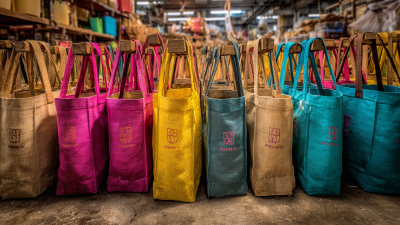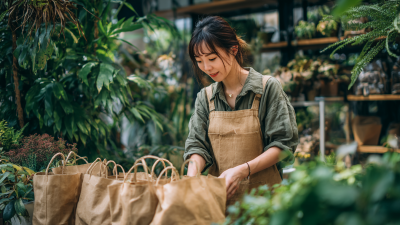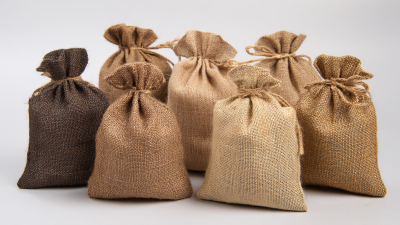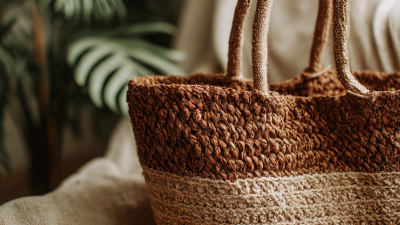7 Unique Ways Eco Friendly Bags are Revolutionizing Sustainable Living
In recent years, the surge in environmental awareness has sparked a significant shift towards sustainable living, with "eco friendly bags" at the forefront of this green revolution. According to a report by Grand View Research, the global market for eco-friendly bags is expected to reach USD 20.6 billion by 2025, demonstrating a growing preference for environmentally responsible products. This shift is not merely due to consumer demand; it is also driven by governmental efforts to reduce plastic waste, as evidenced by the implementation of plastic bag bans in numerous regions. These innovative bags, made from materials like organic cotton, jute, and recycled polymers, are not only reducing our reliance on single-use plastics but are also reshaping our lifestyle choices, promoting a more sustainable and conscious way of living. As we explore the unique ways eco friendly bags are revolutionizing sustainability, it becomes clear that these simple yet effective tools are essential in the fight against environmental degradation.

Table of Contents
[Hide]
Revolutionizing Your Grocery Runs: 3 Ways Eco-Friendly Bags Transform Shopping Habits
Eco-friendly bags are not just a trend; they are a pivotal shift in how we approach our shopping habits. According to a report by Research and Markets, the global reusable bags market is expected to reach $20 billion by 2027, driven primarily by increasing consumer awareness of environmental issues. One major transformation in grocery shopping is the reduced reliance on single-use plastics. Studies show that in regions where legislation has banned plastic bags, there has been a 90% decrease in plastic bag consumption, highlighting the effectiveness of eco-friendly alternatives.

Additionally, eco-friendly bags encourage bulk purchasing and mindful consumption. A survey conducted by the Environmental Protection Agency (EPA) revealed that consumers using reusable bags are likely to buy in larger quantities, reducing the frequency of shopping trips. This not only saves time but significantly lowers the carbon footprint associated with transportation. The convenience of durable, stylish, and functional eco-friendly bags also transforms the overall shopping experience, making sustainability a seamless part of daily life. As these innovative bags become more integrated into grocery runs, they foster a collective commitment to a greener future.
5 Compelling Reasons Eco-Friendly Bags Reduce Plastic Waste Effortlessly
Eco-friendly bags are making a significant impact in the fight against plastic waste. Firstly, they are often made from sustainable materials such as organic cotton, jute, or recycled plastics, which drastically reduce the need for fossil fuel-based products. Unlike traditional plastic bags that take hundreds of years to decompose, these eco-friendly alternatives can either break down naturally or be recycled, promoting a circular economy. This shift not only cuts down on pollution but also encourages consumers to adopt more mindful shopping habits.
Moreover, the convenience of reusable eco-friendly bags plays a crucial role in reducing plastic waste. With their durable design, these bags can be used multiple times, making them an efficient choice for everyday shopping. Many eco-friendly bags are designed to fold easily, allowing individuals to carry them on the go, ensuring they are always prepared. They also often feature vibrant designs and personalization options, which can enhance the shopping experience and make going green more appealing. By effortlessly integrating these bags into daily life, consumers can significantly diminish their reliance on single-use plastics and contribute to a cleaner planet.
7 Unique Ways Eco Friendly Bags are Revolutionizing Sustainable Living
In recent years, the rise of eco-friendly bags has played a significant role in reducing plastic waste. The following chart illustrates how different types of eco-friendly bags contribute to sustainable living based on their impact on waste reduction.
Innovative Materials: 4 Eco-Friendly Bag Designs Paving the Way for Sustainability
The rise of eco-friendly bags marks a significant shift in sustainable living, particularly through the innovative materials driving their design. According to a study by the Environmental Protection Agency, single-use plastic bags contribute to over 300 million tons of plastic waste annually. In response, designers are turning to alternative materials that not only reduce this footprint but also offer durability and functionality.
One exciting development is the use of recycled PET (rPET), derived from post-consumer plastic bottles. A report from the Global Recycling Foundation indicates that every ton of rPET can prevent the release of approximately 3.5 tons of carbon dioxide. This innovative approach not only keeps plastics out of landfills but also turns waste into a valuable resource. Additionally, materials like organic cotton and hemp are gaining traction as they are biodegradable and require fewer pesticides to grow, thus minimizing environmental impact.
Furthermore, the incorporation of biodegradable polymers, such as polylactic acid (PLA), is revolutionizing the production of eco-friendly bags. Research from the Biodegradable Products Institute shows that PLA can decompose in commercial composting facilities within 90 days, significantly reducing long-term waste. These advancements highlight how the industry is creatively addressing sustainability challenges while paving the way for a greener future.
The Convenience Factor: 3 Ways Eco-Friendly Bags Enhance Everyday Living
As the world shifts towards sustainability, eco-friendly bags are emerging as a pivotal tool in enhancing everyday living. Firstly, the convenience of these bags cannot be overstated. A study by Grand View Research projects that the global reusable bags market will reach $20.3 billion by 2027, underscoring consumers’ growing preference for practical and environmentally friendly alternatives. Eco-friendly bags are lightweight yet durable, making them ideal for various uses—from grocery shopping to beach outings—thus encouraging their daily use and reducing dependency on single-use plastic bags.
Additionally, eco-friendly bags often feature innovative designs that cater to modern lifestyles. For example, many brands are integrating smart technology, such as foldable designs and built-in pockets for convenience, appealing to tech-savvy consumers. The National Resources Defense Council (NRDC) notes that by switching to reusable bags, an individual can prevent approximately 1,500 plastic bags from entering landfills annually. This not only simplifies the shopping experience but also contributes significantly to waste reduction efforts, promoting a sustainable lifestyle that resonates with environmentally conscious individuals.
Incorporating eco-friendly bags into daily routines not only simplifies shopping but also serves as a statement of personal values, reinforcing the collective effort towards a greener planet.
Eco-Friendly Bags and Community Impact: 5 Reasons They Bring People Together
 Eco-friendly bags are not just a sustainable alternative to single-use plastics; they also play a crucial role in fostering community connections. One of the primary reasons these bags bring people together is their ability to promote local businesses. Many eco-friendly bags feature designs from local artists or are sold by community-driven organizations. This collaboration strengthens the bond within neighborhoods as residents rally behind products that reflect their local culture and values.
Eco-friendly bags are not just a sustainable alternative to single-use plastics; they also play a crucial role in fostering community connections. One of the primary reasons these bags bring people together is their ability to promote local businesses. Many eco-friendly bags feature designs from local artists or are sold by community-driven organizations. This collaboration strengthens the bond within neighborhoods as residents rally behind products that reflect their local culture and values.
Moreover, the movement towards using eco-friendly bags often spurs awareness about environmental issues, encouraging community members to engage in discussions and collective actions. Workshops on creating reusable bags or educational campaigns about reducing waste frequently bring individuals together in shared spaces, fostering a sense of camaraderie. These gatherings not only empower people with knowledge and skills but also cultivate friendships rooted in a common goal: the commitment to a more sustainable lifestyle. Through shared experiences and support, eco-friendly bags become a symbol of collective responsibility, weaving tighter social fabrics in communities dedicated to making a positive impact on the planet.
Related Posts
-

Exploring Unique Alternatives to Eco Bags for Sustainable Living
-

How to Choose the Perfect Eco Bags for Your Sustainable Lifestyle
-

Discover Unmatched Quality of Eco Bags from China Leading Factories Trusted by Global Buyers
-

How to Choose the Best Sustainable Bags for Your Business: An Expert's Guide to Eco-Friendly Solutions
-

Global Sourcing of Best Hessian Bags Made in China A testament to Quality and Innovation
-

How to Choose the Right Jute Bag for Your Sustainable Lifestyle

We are the most reliable and proficient jute goods manufacturer & supplier that helps businesses or individuals with various exportable agricultural commodities biz and jute goods by shipping them worldwide. Our right-time service ensures that whatever color and size of jute product you need, we can make it happen anytime and anywhere! Let’s keep our earth safer to live in!
Important link
Address
Bangladesh Address:
Fair Plaza (9th Floor), Plot : 3C, Section : 01, Mirpur, Dhaka:1216
UK Office:
242 Manor Road, Droylsden, Manchester, M43 6JD, United Kingdom.
Let's Talk

We are the most reliable and proficient jute goods manufacturer & supplier that helps businesses or individuals with various exportable agricultural commodities biz and jute goods by shipping them worldwide. Our right-time service ensures that whatever color and size of jute product you need, we can make it happen anytime and anywhere! Let’s keep our earth safer to live in!
Get Started
Let's Talk
Address
Bangladesh Address:
Fair Plaza (9th Floor), Plot : 3C, Section : 01, Mirpur, Dhaka:1216
UK Office:
242 Manor Road, Droylsden, Manchester, M43 6JD, United Kingdom.